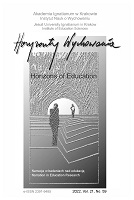Doświadczenia wojny a ich znaczenie w edukacji młodych pokoleń (na przykładzie zbrodni ludobójstwa popełnionej w Wąskim Lesie 12 lutego 1940 roku)
Wartime Experiences and Their Role in the Education and Upbringing of Young Generations (on the Example of the Genocide Committed in Wąski Las on 12 February 1940)
Author(s): Bozena Józefów-CzerwińskaSubject(s): History, Education, Studies in violence and power, WW II and following years (1940 - 1949)
Published by: Uniwersytet Ignatianum w Krakowie
Keywords: intergenerational reception; wąski las; history education; peace education in values for the future; genocide;
Summary/Abstract: RESEARCH OBJECTIVE: The aim of the study is to present the war experiences in relation to a specific historical context that has educational and educational value. THE RESEARCH PROBLEM AND METHODS: The main problem of this study is related to the question of what is the importance of passing on the knowledge of the crime of genocide (committed by the Nazis in the Wąski Las) to future generations. The research methodology developed in the framework of memorial and ethnohistorical studies projects was applied. THE PROCESS OF ARGUMENTATION: At first, the crimes of genocide committed by the Nazis in the Narrow Forest are presented. The mechanisms leading to violence and the importance that individuals who oppose the crimes can have are also described. RESEARCH RESULTS: History education helps to make young people aware of the importance of opposing evil for the sake of others, but also for their own future. CONCLUSIONS, INNOVATIONS AND RECOMMENDATIONS: Knowledge about crimes and mechanisms leading to evil should be a reason for deep reflection of young people, so that they can face the threats of the modern world.
Journal: Horyzonty Wychowania
- Issue Year: 21/2022
- Issue No: 59
- Page Range: 89-98
- Page Count: 10
- Language: Polish

